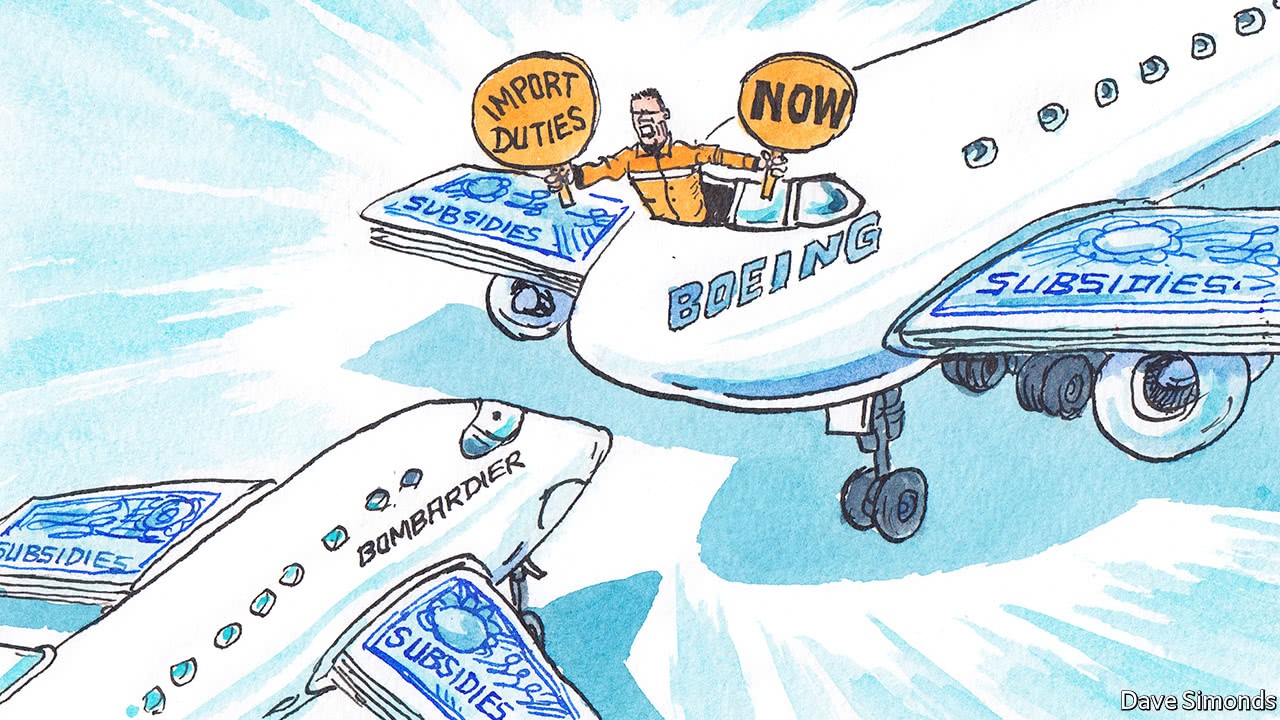
Should we be feeling sorry for “our Canadian” Bombardier as it is being picked on by the US giant Boeing which, in turn, is being backed by US government? On Ocober 26, as reported by the Canadian Press “the US Department of Commerce clobbered aerospace giant Bombardier with a 220% duty on the sale of its CS100 commercial jets to a US airline following a trade complaint from an American rival.” Put plainly, the price tag of the Bombardier plane will triple. In the weeks preceding this decision, and as the dispute simmered, Justin Trudeau, not noted for playing the hard man, had upped the rhetoric: “We won’t do business with a company that is busy trying to sue us.”
The Background
What’s behind this? The giant US plane-maker decided to press the Trump administration to impose duties on commercial jets made by Bombardier. Boeing says its smaller rival is using Canadian government subsidies to sell its aircraft to the US carrier Delta, at below cost price.
The Economist writes: “Nobody, in either the US or Canada, questions that Bombardier has had vital financial support from the Canadian and British governments since 2005 for its small jetliner, the C-Series. As the plane’s development costs soared, to $5.4bn, Bombardier struggled to find buyers for it; financial trouble followed. An estimated C$4bn in state support, including C$2.8bn in 2015, stopped a nosedive. It was not until 2016 that the aircraft’s future seemed assured, when Delta ordered 75 units. Boeing then accused Bombardier of dumping the jets into America at ‘absurdly low’ prices and asked the Commerce Department to impose countervailing duties.”
The “Free” Market and Subsidies
The Bombardier plane is the new kid on the block – the C series is specially built for the 100-150 seat market; it’s not a stretched or shrunken version of another plane while its relative fuel efficiency and quietness make it an attractive proposition for airlines using urban airports where noise regulations are in place. On the other hand, Boeing’s best alternative, the 737-700, with 17 years of flying time and having close to 50% of the existing market (the French owned Airbus A-319 having the remainder) obviously could see the writing on the wall – their market share and profits were being threatened.
Is this a dispute between a virtuous free market, capitalist Goliath and a sneaky but smaller, state subsididized David. Hardly. As The Economist concedes, “Boeing itself got billions of dollars of help (in the form of military contracts) to get off the ground back in the 1950s and 1960s.” But the subsidies didn’t end in the 1960s. According to Good Jobs First, Boeing has received $13 billion in subsidies. In 2013, Washington State gave Boeing a $8.7-billion handout, yet the company has cut 12,655 jobs, or more than 15% of its Washington workforce, since then.
Labour Movement’s position

What position should Canadian labour and the left take in this dispute? After all, if Boeing wins its case, there is the threat of 3,500 jobs being lost in Toronto and Montreal (and a further 4,500 in Northern Ireland, where Bombardier is the largest private-sector employer – this explains Teresa May’s recent cosying up with Trudeau to do battle against Goliath).
It should be pointed out that, Boeing or no Boeing, Bombardier is first and foremost a multinational capitalist business concerned with its bottom line. A year ago, it announced the plan to cut its global workforce by 7,000 (2,800 of them in Canada) – all in the name of “restructuring”. And then 6 months ago, the restructured Bombardier announced a 50% increase in salaries/stock options for its top executives. The reaction of the man who won’t do business with a company trying to sue “us” was: “we respect the free market and the choices that companies will make.” No doubt, Goliath would like Canada and Bombardier to show respect to its own concept of the free market.
Waving the Maple Leaf
Of course, the Bombardier unions (mainly Unifor and the Machinists) should be arguing strongly for the protection of their members’ jobs in Canada. But you don’t do this by jumping into bed with Bombardier management and wrapping yourselves up in a Maple Leaf flag. On September 13, workers in Montreal marched in front of Boeing’s downtown office and the U.S. consulate. On September 20, a rally was held at the Bombardier plant in Toronto. The Toronto Star reported on it as follows: “An unusual scene took place Wednesday as unionized workers left their posts at Bombardier’s plant in north Toronto — not to protest stalled labour negotiations but to express solidarity with the company in its battle against U.S.-based aerospace giant Boeing.” The Star went on to quote a worker, “We’re in it together. We had management here, upper management here, and they want to bring awareness to what’s happening here, and we’re hoping that this fight will be favourable for us in Canada.”
While such sentiments might be understandable from the perspective of an ordinary worker, the same cannot be said for the union leadership. Speaking at this same rally, Jerry Diaz, national Unifor leader declared: “This is about a Canadian market, this is about a Canadian plane, this is about Canadian technology, this is about Canadian innovation, this is about Canadian jobs, and we’re not going to let anybody take it away from us!” Fighting words yes, but Diaz didn’t have anything to say a year ago when Bombardier layoffs were announced or 6 months later, when Bombardier execs announced their 50% pay increase. And two weeks prior to that announcement, Diaz wrote an article in the Huffington Post praising the Liberal investment in Bombardier and criticising anyone who termed it “corporate welfare.”
Nationalization and Socialist Planning
Diaz is playing a tired and worn nationalist card as he uses the position of “we’re in it together.” Bombardier is ripe for nationalization. It is hardly the poster child for innovation and efficiency. Its train and subway division is notorious for late deliveries to its municipal transit customers. Instead of accepting the situation of the company being cosetted with taxpayer subsidies, labour should be taking the lead in campaigning for public ownership. After all, if Bombardier needs public funds then the public should have a real say. This should be accompanied by an appeal to the Boeing unions for cooperation to avoid workers in one country being played off against the other. Workers at both Bombardier and Boeing are facing job cuts, so the Canadian unions need to link up with their US counterparts at Boeing to develop a common strategy that is to the benefit of the workers, not the mythical “team.”
The situation with these two companies is a clear illustration of the bankruptcy of capitalism with its waste and mismanagement of resources. Imagine what could be achieved with democratic socialist planning after the “demand” for prestigious, expensive military aircraft has been eliminated and the resources, technology and science have been pooled to produce aircraft for civilian purposes. Going further, imagine what that pooling and cooperation might come up with when it comes to fueling those planes so that they can fly and have minimal impact on the environment, or even develop and build more ecological forms of transport.

